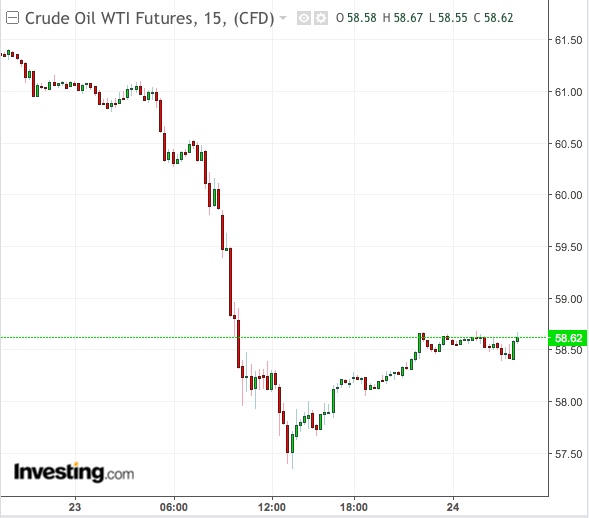If there’s one person who’s enjoying the trade war with China, it’s Donald Trump. The U.S. President made that clear two weeks back: “I love the position we’re in”, he said as he gushed about the revenue the government would likely make from his higher tariffs—which economists dispute anyway. Trump was saying all this even as Beijing planned to retaliate against his multiple hostilities, well before the escalation of his fight with Huawei.
But there’s something else Trump is possibly enjoying now aside from punishing China on trade, although he isn’t tweeting about it, like he used to. And that’s lower oil prices.
One of the greatest casualties of this week’s trade war-related market ruptions has been oil.

On Wednesday, West Texas Intermediate, the benchmark for U.S. crude, fell 6%, crashing below its $60 per barrel support of the past month. Brent, the U.K.-traded global benchmark for oil, slumped 5% to below its $70-per-barrel perch. It was the worst trading day for crude since the beginning of the year and after the start of OPEC production cuts in December. As of early Asian trading on Friday, WTI was destined for a weekly drop of 7% and Brent 6%, though year-to-date they remained up 29% and 27% respectively.
Being one of the biggest risk assets in the macro space, it isn’t surprising for oil to be one of the most vulnerable in the present environment.
Why Would Trump Escalate Trade War Now?
What remains ambiguous though is the timing of the whole thing.
Trump hasn’t been clear on why he chose to up the ante against the Chinese tech sector at this particular time, other than making it seem like a progression of his efforts to rein in a stubbornly wayward China on trade.
Yes, it could be annoying when a party you’ve negotiated with for months appears to be going back on what’s been agreed.
Yet, if history is any guide, China has never been an easy side to outwit on trade.
Trump has been telling his voter base in political rallies of the past few weeks that he remains focused on getting America the “best deal” and the escalation of the trade war was a necessary evil for the greater good of the United States, something he accused his predecessor Barack Obama of wilfully neglecting.
Still, for the president to throw away six months of negotiations that began with his December summit with Chinese leader Xi Jinping at last year’s G20 in Buenos Aires—especially after repeated assurances by officials from both sides, including Trump, that all was going well and that a deal was imminent—makes little sense to his detractors.
It isn’t surprising then that his rivals might suspect political expediency as Trump’s motivation, given that, even after the end of the Mueller investigation, the president continues to face potential impeachment as Democrats maintain that he obtained Russia’s help to win his 2016 election. This theory is expounded by deeds like his direct aid of $16 billion to U.S. farmers hurt by the trade war. While there’s certainly merit in the award, there’s no mistaking that it could also endear Trump to his voter base, particularly soybean growers in the Midwest, as he preps for his November 2020 reelection.
Low Oil Prices Always On Trump’s Agenda
Like it or not, low oil prices have remained high on the president’s political agenda, regardless of whether the current market crash is an unintended “bonus” of the trade war.
In fact, the efficacy at which Trump’s face-off with China has offset tensions arising from the president’s other battles with Iran and Venezuela—that just a week ago had pushed crude prices to 2019 highs—seems to suggest some astute planning on his part aimed at getting such results, rather than just sheer coincidence.
While Trump hit China with additional tariffs as early as May 5, his latest actions against Huawei only began on May 15. That was just before the May 19 meeting of the OPEC+ alliance in Jeddah that already signaled to the energy world what its outcome would be—that the Saudis had no intention of relaxing output cuts despite achieving a near 40% rally in crude prices this year.
Of course, this week’s belly-up in oil prices wasn’t only caused by China. It was due as much to the surprise U.S. crude build of about 5 million barrels, on the average, for a second running week and muted refinery runs ahead of Monday's Memorial Day holiday, which typically marks the start of the peak summer driving season in the U.S.
To suggest the president had stalled trade talks with China just to get his way with oil prices may seem offensive to proponents of the Trump administration.
Yet, with analysts often seeing the absence of a trade deal as the only barrier to an unstoppable oil rally that could even push Brent past $90, one might wonder how badly Trump wants that right now.
